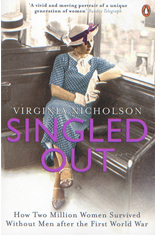Singled Out
I’ve very much enjoyed Virginia Nicholson’s Singled Out: How Two Million Women Survived Without Men after the First World War. It is the kind of gossipy, anecdotal history that is very easy to read.  Nicholson has done an enormous amount of research. The pages throng with remarkable women who managed to find meaning in life without a husband or children: women like Gertrude Caton-Thompson who trained as an archaeologist in her thirties, travelled extensively on digs, and ended up teaching at Newnham College: Mary Grieve who was editor of Woman magazine for 30 years; many writers, including Elizabeth Jenkins and Elizabeth Goudge. Women lawyers, teachers, stockbrokers, and engineers all seized their chance. But if one thing comes over strongly, it is that while middle class and upper class women could often find worthwhile and financially rewarding employment, for working class women it was the tough life of a shop girl or factory worker. For them, marriage must surely have been preferable, even if as Nicholson points out, it was rarely a bed of roses.
Nicholson has done an enormous amount of research. The pages throng with remarkable women who managed to find meaning in life without a husband or children: women like Gertrude Caton-Thompson who trained as an archaeologist in her thirties, travelled extensively on digs, and ended up teaching at Newnham College: Mary Grieve who was editor of Woman magazine for 30 years; many writers, including Elizabeth Jenkins and Elizabeth Goudge. Women lawyers, teachers, stockbrokers, and engineers all seized their chance. But if one thing comes over strongly, it is that while middle class and upper class women could often find worthwhile and financially rewarding employment, for working class women it was the tough life of a shop girl or factory worker. For them, marriage must surely have been preferable, even if as Nicholson points out, it was rarely a bed of roses.
For many women in all classes the absence of children was a sadness. Many played roles as aunts and godmothers, but few in those day dared have an illegitimate child to raise alone. It’s a pity that so few felt able to follow in the footsteps of Rosamund Essex, editor of the Church Times, who as a single woman adopted a little boy, a touching success story
Nicholson writes in the introduction that at thirty she was still unmarried and expected to remain so, but two years later found herself planning her wedding. For me it all came even later and I thought as I read this book about what it must have been like to have no choice about marriage or children because there just weren’t enough men to go round. I wonder too how many of the (mostly) single women teachers at my girls’ grammar school in the sixties had lost the men they might have married in WWII – or whether they simply preferred a career – or other women (not a thought that occurred to me in those days!)
8 Comments
tracybham
March 2, 2015This is an interesting post about an interesting book. It looks like the author has also written other books I would be interested in. Glad I saw this.
Christine Poulson
March 3, 2015Thanks, Tracy. I’ve also read Millions Like Us by this writer. It’s about the experiences of ordinary people in WW2 and is also very good.
Helen R Hardie
March 3, 2015The headmistress and her senior teacher at my Tasmanian boarding school were both devoted and committed teachers … Both single women … in the 1950s. … And we always suspected that they had lost ther men in the 1st WW. But life was so private there, we never really knew.
Christine Poulson
March 3, 2015Good to hear from you, Helen. Yes, people didn’t wear their heart on their sleeves in those days.
moira @ Clothes in Books
March 14, 2015Yes, I read and liked this book, and felt it was informative and salutary.
Christine Poulson
March 15, 2015Thanks, Moira. I see she has just got a new one out: about women in the fifties.
Margaret Powling
March 17, 2015This is one I want to read. I have just ordered V Nicholson’s latest, about women in the 1950s (sadly, I’m old enough to remember the era!) to check out if it coincides with my memory of that time. Looking forward to it.
Christine Poulson
March 17, 2015Good to hear from you, Margaret. Yes, I want to read the new. Millions Like Us is good, too.